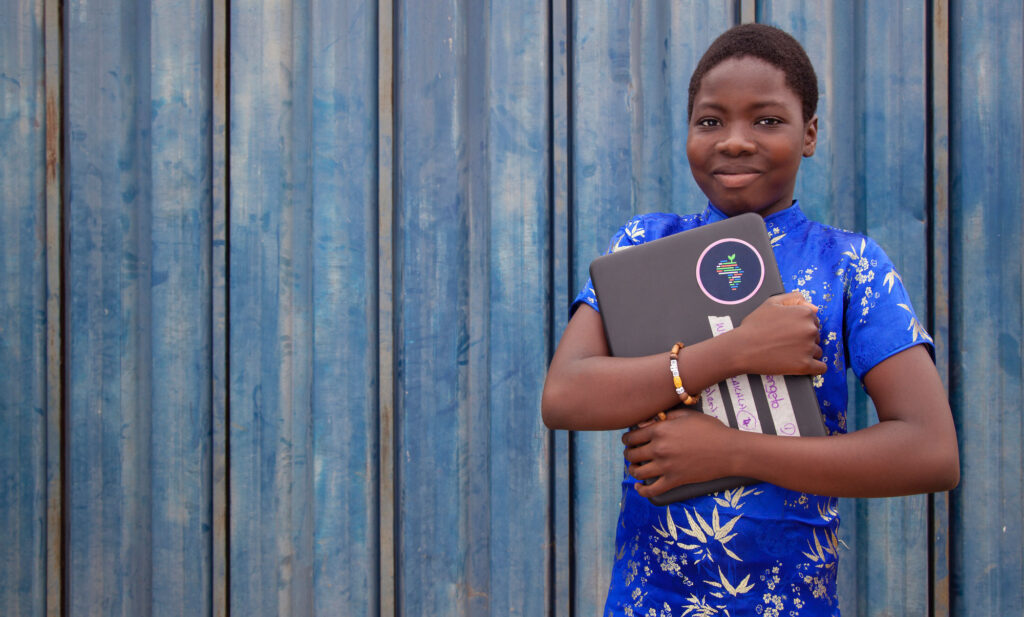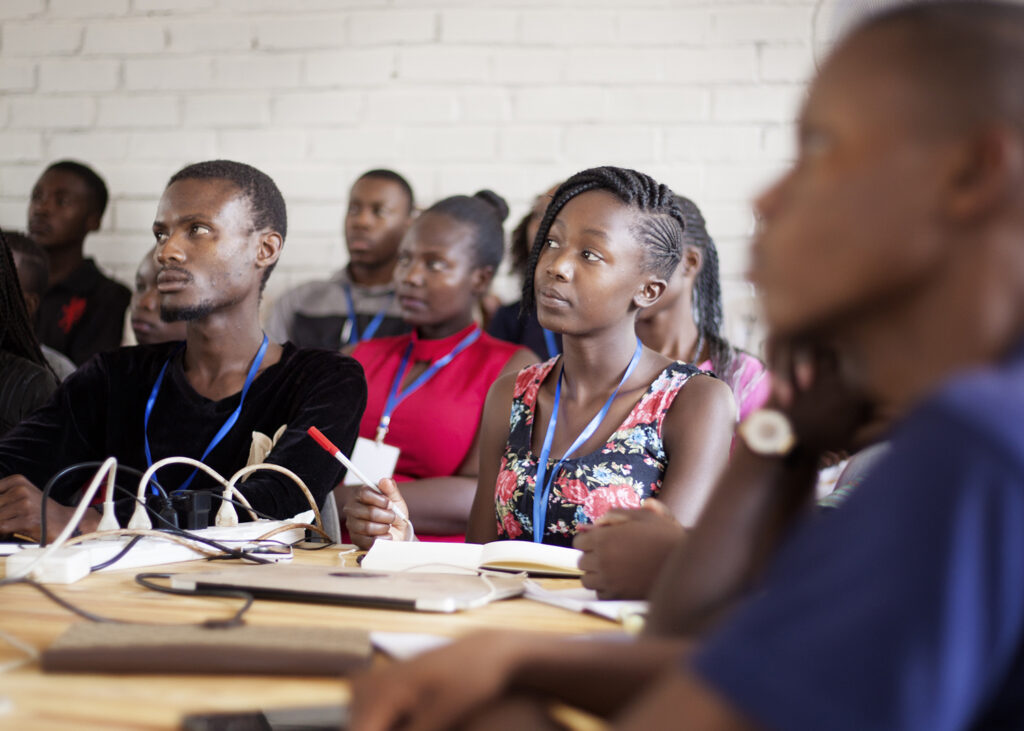Teaching coding in Zimbabwe

When Uncommon first launched in Zimbabwe at the end of 2017, its goal was to teach youth and young adults how to code. The founders Peter, Clive, and Norest, from the US and Zimbabwe, could see how there was a huge thirst for technology education in the country, as well as a lack of opportunity for youth and young adults to learn these skills.
Uncommon’s initial model was simple – to train unemployed young adults to be after-school coding instructors. This worked so well that Uncommon decided to focus even more on training young adults for the tech workforce to make a bigger impact. To address the infrastructure challenges they had been facing, the Uncommon team upcycled shipping containers to be used as offices and training centres, and installed solar power. They built the first innovation hub in 2019.
There are now six innovation hubs in Zimbabwe, with 35 employees in total. A team of four or five instructors runs each innovation hub. They are responsible for training young adults on a one-year programme called ‘bootcamp for the technology workforce’. The young adults receive their training for free, and they are then responsible for teaching free computer coding classes at Uncommon’s partner schools in the neighbourhood. Through this model, Uncommon trains young adults for tech employment, while simultaneously teaching computer coding to thousands of school children.
Tanyaradzwa Nyamusara was one of the young women who benefitted from the training. Coming from a small town in Zimbabwe, she first learned about Uncommon when she was 16. “Though I knew nothing about technology, I was curious and decided to join,” she says. “Before long, I fell in love. I got so good that I was even invited to New York City for an assignment with ‘Girls who Code’.” However, a few months before travelling, just before turning 17, Tanyaradzwa found out that she was pregnant. “Many people thought that this was where my story would end,” she says. “But really, it was just the beginning.”

Today, Tanyaradzwa is a front-end developer at Uncommon, overseeing the coding education in six of the innovation hubs. She also helps train the young adults who teach thousands of school children. She has her whole life ahead of her and she is excited about what the future holds. “I am a high school drop-out and a teen mom,” she says. “I am also a developer and a believer in humanity and all that we can do. I am uncommon.”
Uncommon has permission from Zimbabwe’s Ministry of Education to teach in the country’s state schools. “In the low-income communities we focus our work in, the unemployment rate is extraordinarily high, and schools lack adequate resources to provide a robust digital education,” says Peter. “Uncommon’s goal is to nurture a generation of talent that will grow existing companies and create new employment opportunities.” And, indeed, already the average annual income of graduates has increased four to five times following their studies with Uncommon.
Uncommon also has a mentorship programme whereby professionals from all over the world give virtual one-onone lessons to the adult students at the innovation hubs. These mentors come from companies including Google, Amazon, Facebook, AutoDesk, Pinterest, and YouTube. We at Oak are excited about this great programme and for what the future holds. This grant is supported through our Special Interest Programme, which reflects the Trustees’ interests in making innovative grants. You can find out more about Uncommon at uncommon.org, and check out our online version of the report to see a video of Tanyaradzwa.
Reducing hunger through school meals
Photo provided by Mary’s Meals: Mavambo partner, Nov 2020
Mary’s Meals works in 19 countries across Africa, Asia, Latin America, Eastern Europe, and the Caribbean. The charity provides life-changing meals to some of the world’s poorest children every day they attend school. It is a simple idea that works. The promise of a daily meal attracts hungry children into the classroom, where they receive a basic education that can provide an escape route from poverty. One of the countries it works in is Zimbabwe. Oak’s first grant to Mary’s Meals in Zimbabwe, made in 2018, supported a school-feeding programme in Matabeleland North, a province in the west of the country. These efforts helped reduce hunger, and promoted access to and participation in school.
The aim of the project was to help increase community support for education, and provide families with a social safety net in times of food insecurity. By September 2019, which marked the end of the first year of the project, 18,302 children in 40 schools in Matabeleland North were receiving school meals. During the Covid-19 crisis in 2020, hunger and need had reached acute levels in many countries. This includes Zimbabwe, where the loss of daily meals when schools closed was a problem for many children and their communities.
The city of Harare, Zimbabwe, was one of the areas worst affected by Covid-19 in the country, with 40 per cent of all recorded cases. The restrictions put in place by the Government to mitigate the spread of the virus prevented many Zimbabweans living in urban areas from earning a living. Surveys conducted in 2020 indicate that nearly 500,000 Zimbabwean households have at least one member who lost her or his job, causing many households to fall into poverty and worsening the plight of the existing poor.[1] This lack of income has led to Harare experiencing increased levels of food insecurity.
Mary’s Meals sprung into action during the lockdown in 2020. Staff tried to find ways to reach children at their homes, working with governments, community leaders and other not-for-profit organisations. One of the organisations that Mary’s Meals worked with in Harare was Mavambo Orphan Care (MOC). Through MOC’s network of community health workers, they worked to reach as many children as possible with nutritious meals, despite the restrictions.
“Coronavirus has affected us in terms of food security, as we are not able to access three decent meals as before,” says vendor Mercy Mutuwa from Harare, who received meals from MOC. “I’m a full-time vendor and our chances to trade have been reduced. I was relieved to know that MOC will be supporting us with food. These meals will go a long way.”
“We are very glad to be working with Mary’s Meals to bring urgent support to families during this time of crisis,” says Danny Gomwe from MOC. “The food is making a world of difference to vulnerable children, especially those living with HIV who need good nutrition to ensure their antiretroviral medication is effective. The need for food in these communities far outweighs available food, so the support we are working together to provide is life-saving.”
As schools reopen, Mary’s Meals is able to serve daily meals at school to thousands of children once again, giving them the energy to learn and thrive. As of 2021 Mary’s Meals is now reaching 74,336 children across Zimbabwe. If you want to find out more about Mary’s Meals, please visit their website: marysmeals.org.uk, or watch the video below.
[1] World Bank– Zimbabwe Economic Update: Overcoming Economic Challenges, Natural Disasters, and the Pandemic: Social and Economic Impacts, June 2021, Issue 3